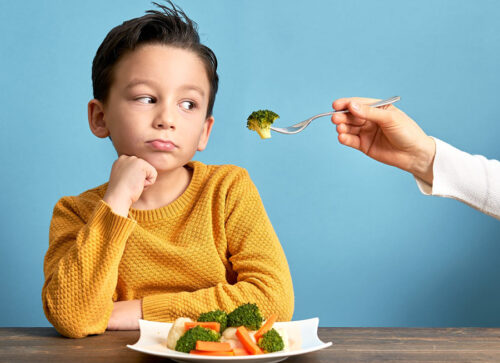Parenting: Picky Eaters
Picky Eaters: “Think of starving children”
Picky Eaters
Nobody ever starved with food on the table
by Gregory A. Barrett, M.D.
Following a fairly brief learning curve feeding baby food to children becomes a simple and enjoyable experience. Perched patiently in their high chairs our sons and daughters resemble baby robins eagerly craning their necks to receive a worm from their mama’s beak, gratefully opening their mouths at the sight of each approaching spoonful until we get bored dishing it out or we receive some signal from our little birdies that they’ve had enough. Easy, huh? And fun, too! But, unfortunately, it isn’t usually very long after the first birthday that everything changes.
One can count on a couple of striking alterations to a child’s dietary habits in the second year of life. First, the range of foods they willingly ingest is going to contract severely, and secondly they will start to eat noticeably less. This newfound selectivity is fairly straightforward. Everything involved in tasting foods from the buds of the tongue to sense of smell to certain areas of the brain are beginning to become more developed. Sweet tastes better than sour, fruits are preferable to vegetables, and ice cream is far superior to anything green.
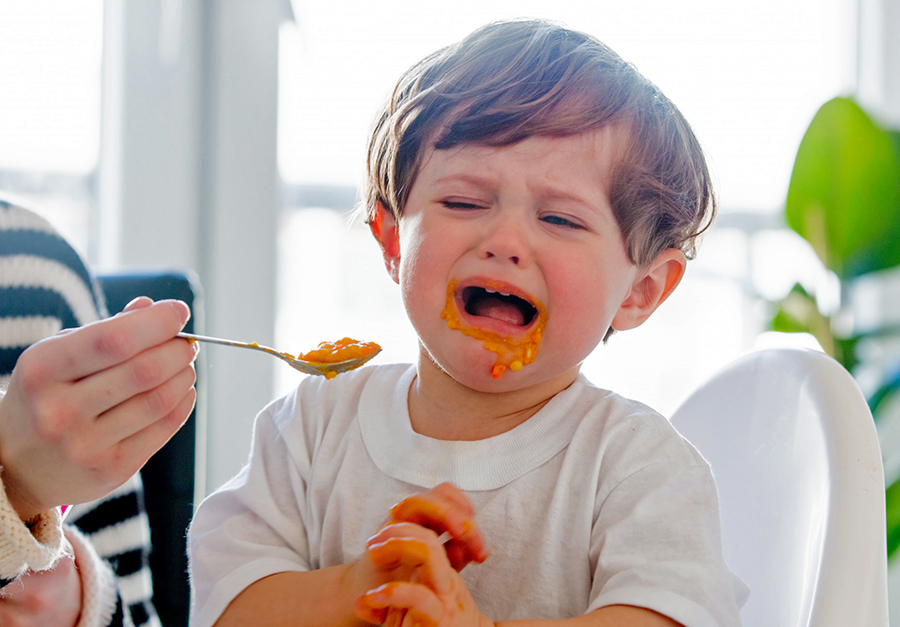
The decline in intake relates to the simple fact that the growth rate declines dramatically after turning one. In the first year a baby typically grows ten to twelve inches and triples his or her birth weight. Obviously if a child kept going at that rate indefinitely it wouldn’t be too long before he couldn’t fit through a door. As a consequence, the caloric requirement per pound of weight adjusts downward; in plain English this means the body requires far less food to sustain appropriate growth.
Even though a parent may be aware that eventually this is going to happen it still takes many of us by surprise. At four to six months of age our baby is drinking twenty to thirty-two ounces of formula per day and at one year the total daily fluid intake is only four to eight, and that’s supposed to be okay? I believe the problem which emerges at this time and causes parents no end of mental aggravation is a concept I call:
THE GAP

This refers to the striking discrepancy between what a mother or father THINKS their toddler should be eating and what they actually NEED, which is considerably less.
Failing to adjust to this new world order can lead to seriously mismatched expectations on the part of the parents betwixt what they feel is a bare minimum intake and what is actually necessary to sustain a normal pattern of growth (roughly a pound every three months). Moms and dads must learn to accept that both the decline in appetite and the concomitant increase in pickiness is normal.
There are two basic issues to be addressed regarding a child’s eating. One, is he or she getting enough to eat? A parent must learn to trust in the powerful, primitive twin drives of hunger and thirst. If appropriate food is offered, your child will ultimately consume enough to meet its caloric requirements. And regarding fluid intake humans of any age or size will literally crawl to the gutter and slurp up sewer water if they become thirsty enough, so don’t be dismayed when after the switchover from bottle to cup the intake of milk plummets. It’s normal. It happens to all kids. In general, all you have to do is provide them with access to food and beverages and with rare exceptions they will end up ingesting precisely what they need.
Eating Yogurt

The second consideration involves whether your kid is eating a healthy enough variety of foods. The answer here will be maybe yes, maybe no. Frequently the heightened selectivity of a toddler can lead to a very restricted diet which is inadequate in addressing the basic needs represented by the four major food groups. But one does have the option of taking out an insurance policy readily available at any pharmacy or grocery store in the form of a chewable Flintstone or the like. Now, there is a way to teach your child to broaden his range, which will be addressed shortly, but in the meantime always remember the following:
YOU CAN LEAD A CHILD TO BROCCOLI BUT YOU CAN’T MAKE HIM EAT IT
(…but you can cover any dietary shortcomings with the administration of a daily multivitamin)
Multivitamins

When determining whether or not your child would benefit from such a supplement, I would encourage you to examine their diet not a meal at a time or even a day at a time but rather over the course of a week.
Children often can be counted on having what I have coined The One-Out-Of-Three Toddler Pattern of Eating. Kids at this age tend to eat one food per meal, one meal per day, or one day out of three days. And that is fine. Your pediatrician or family doctor will be monitoring the adequacy of their caloric quantity at regular intervals (remember, scales don’t lie) so all you have to do is evaluate their eating quality and respond accordingly with a vitamin if necessary.
I am often asked: “how long is it allowable to give children baby food.” The answer it that baby foods never become toxic at any age. A couple jars of baby food would undoubtedly be preferable to the peanut butter and jelly sandwich, Cheez-Its, and decaffeinated Coke which routinely resides in my GI Joe lunch box. The point is that these infant foods can be offered indefinitely. Our second child was still primarily consuming baby foods up until his second birthday (granted, due largely to his parents’ laziness), and he absolutely thrived on his Beech-Nut diet.
Organic Fruit

Another topic which arises frequently in the office is the organic vs. non-organic debate. A recent major review by prominent pediatric nutritionists seemed relatively pragmatic in its interpretation of where the science is at present. As of now there simply isn’t much in the way of hard evidence that additives cause measurable health hazards, and there is a significant additional premium to the cost of organically prepared foods. On the other hand it must be blatantly obvious to anyone that there is no health benefit whatsoever to putting hormones in the milk we drink or pesticides and fertilizers on our fruits and vegetables. In conclusion, if price is not an object and you can afford it by all means go organic. It’s safer, preferable, and fresh is undoubtedly the best. But if cost is a consideration given what we know now it still seems to be okay to stick with traditionally prepared foods.
Pizza
Our son Keith was a notoriously picky eater right from the get-go, and as is so often the case his lack of adventurousness when it came to eating did not end with graduation from toddlerdom. Actually, he developed a number of fairly interesting theories when it came to food.
According to Keith ketchup qualified as a vegetable. He proclaimed that pepperoni pizza was God’s perfect food, all four major groups represented in each delicious slice. (Well, I suppose he did have a point there.) His stated philosophy as a little boy regarding nutrition was that he would never try a food that he hadn’t eaten previously. I know, I know, that makes no sense whatsoever, but remember, we were dealing with Keith Barrett.
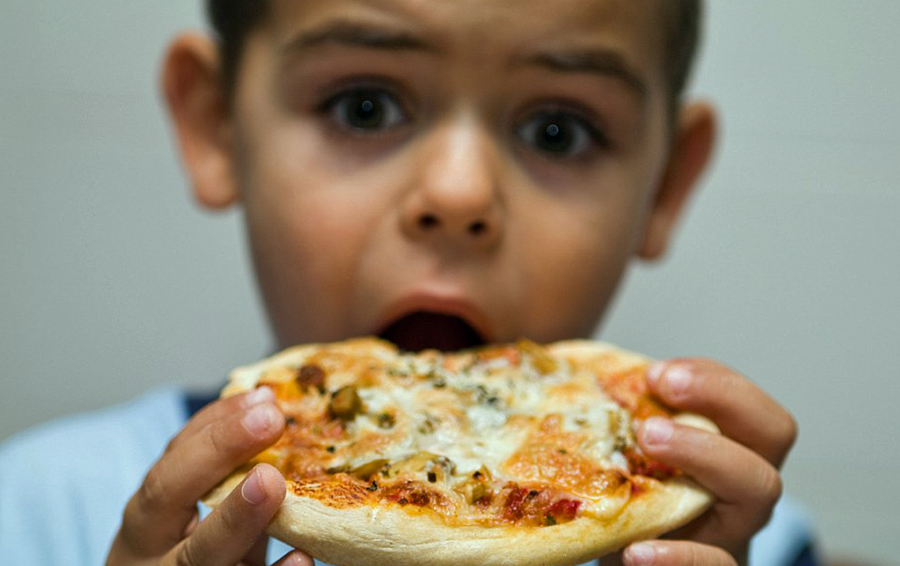
On one memorable family vacation to Hawaii he went on a hunger strike as a result of this belief. His sister and I were all in favor of letting him starve but the sight of his skinny and dwindling little arms proved to be too much for his mom to bear so on the fourth day she broke down and he got his way in the form of a McDonald’s pizza—pepperoni, of course. Needless to say Rachel and I were quite disappointed. Eventually he did expand his range of foods, but this only occurred as a direct result of his mother and I being forced to step up to the plate and taking a much more active role in teaching him some harsh lessons about eating.
Moms and dads who overreact to the natural decline in intake and lack of flexibility can find themselves maneuvered by their sons or daughters into some severely limited choices, and therein lies the real danger to their children’s health.
It is not uncommon at all to be told that a child’s entire intake consists only of macaroni and cheese, chicken nuggets, McDonald’s french fries, and apple juice, but my first year in practice I came across a diet I don’t think will ever be topped.
The parents in question were an older couple who had been referred to me for consultation regarding their child’s nighttime habits, I somehow having established something of a reputation early in my career as a guru for sleep problems.
The mother and the father were both college professors and their nearly three-year-old son had been sleeping in the same bed with them for his entire life. (First mistake.) Needless to say the situation had grown to the point where nights in their house had become a complete disaster with none of them getting any rest whatsoever.
I supplied them with the explanation of what was happening and the hard advice necessary to break this pathologic pattern but it was apparent from the looks on their faces that what I was selling they weren’t buying. Trying to be comprehensive and deal with the child as a whole I soldiered on nonetheless and inquired about Tristan’s eating habits.
Snickers is not a Food Group

“Ahh,” sighed the father, shaking his head, “that’s another problem altogether.”
“Yes,” the mom sadly agreed. “It’s terrible.”
“How so?” I asked. “Tell me about it. What does he eat?”
“Snickers,” replied Tristan’s dad.
“Snickers?”
“Yes.”
“And?”
“And what?”
“And what else?”
“That’s it.”
“Nothing but Snickers?”
“Huh-uh.”
I was having trouble believing my ears, but I persisted. “Just Snickers?”
“Yes.”
An uncomfortable period of silence ensued.
“How long has this been going on?”
“What do you mean?”
“Well, how long has Tristan been eating nothing but Snickers?”
“Oh, I’d say about a week or two.”
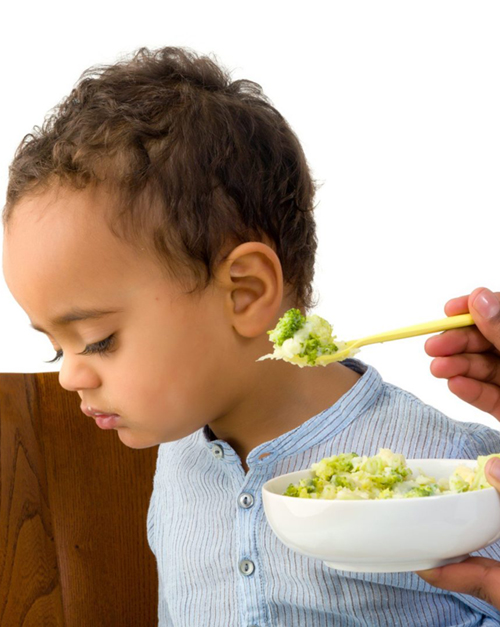
I stared at them in amazement. Here they were sitting in front of me, two obviously intelligent, exhausted, but well-intentioned parents, not looking any different than you or I. How on earth could they be doing something so obviously foolish? What was their thinking? And why? I had to know.
“If you don’t mind my asking, just exactly how did it come about that you are feeding your son nothing but candy bars?” I queried.
The two of them looked at each other in amazement every bit the equal of mine that such a naive question could possibly be posed. Finally the father turned to me and in a voice one would normally reserve solely for the purpose of explaining an obvious answer to a small child he replied slowly, “Because he won’t eat anything else.”
We talked for a while longer and before leaving the office they did finally express a half-hearted pledge to try to do some things differently. That is the end of the story; I never saw this family again. So, how bad can your child’s eating habits become if you’re not careful and remember to retain your control and authority as the parent? The answer, as demonstrated so graphically by this unforgettable couple, is pretty darned bad indeed.
A severely limited diet can be an absolutely terrible thing to happen nutritionally, and it is completely the mom and dad’s responsibility to avoid such a scenario. Prevention is not nearly as difficult as one would think if this simple rule is followed:
A Parent’s Responsibility Begins and Ends With Serving Nutritious Foods Three Times a Day
Family Dinner

There you go. That’s it. That’s all you have to do. You’ve done your duty, the rest is up to them. Don’t give in—you know what’s best, they don’t. And stop fixing those special meals for your children! The kids can eat what their parents are eating. I strongly suggest at the VERY latest you desist from this practice by around the third birthday.
No matter how much poor eating habits grind at the very core of your parenting soul always strive to keep mealtimes pleasant. Getting overly hyped about how pathetically your offspring is eating and creating a hostile atmosphere at the dinner table does not improve matters in the least. Take my word for it, pretty soon your child will be eating even less and complaining of his or her stomach hurting as soon as they sit down on their chair. And furthermore they are not making this up, the tension surrounding mealtimes can lead to gastric hyperacidity and a stomach ache which is not helpful with improving appetite in the least. Train yourself to develop more of a relaxed “what you eat, you eat, what you don’t, you don’t” attitude. It’s better in the long run to simply let them get down and go play when they announce that they’re finished rather than trying to enforce some tortuous, pointless rule such as they are not allowed to leave the table until they’ve finished their squash. A laid-back approach will serve you, and your child, much better in the long run.
Eating Vegetables
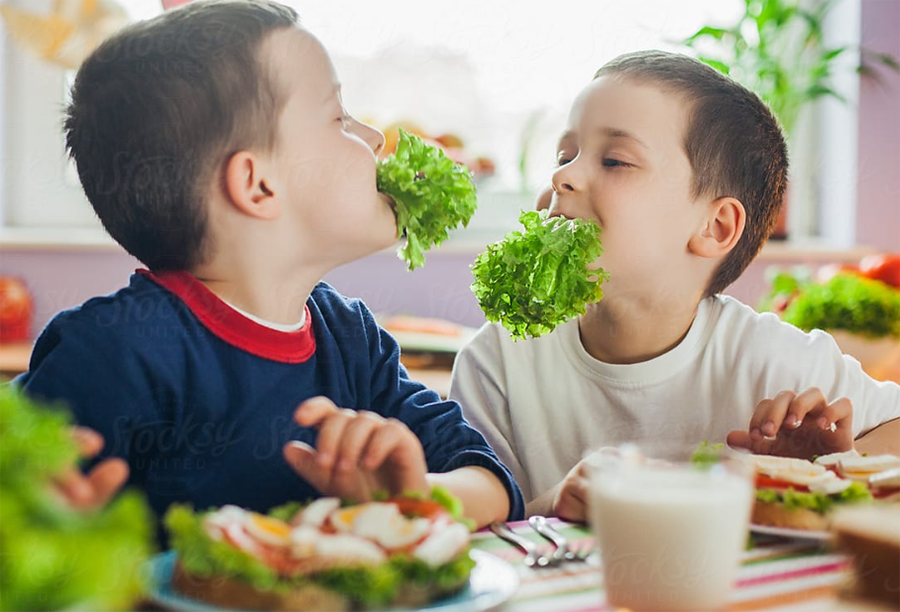
Now I hope it should surely be obvious that dessert MUST be contingent upon a child eating the no-thank-you minimum of the foods placed on his or her plate. And the definition of the no-thank-you portion? That’s easy. It’s whatever the mother or the father declares it to be. Period. Remember, you’re the boss. Questions? No? Good.
If your child is consistently not eating well at the regularly scheduled mealtimes you MUST cut out snacks. Between meal offerings are not and should never be considered emergency rations medically required to stave off starvation or a catastrophic nutritional outcome. And, please, no rationalizing about snacks being nutritious. All they are is appetite defeating. Of course if your child is doing a good job at his meals then, sure, they are certainly entitled to an occasional banana or whatever as a treat between breakfast and lunch or lunch and dinner. But if they are not eating their meals with predictable regularity then no snacks. And I do mean none, zero, nada, nary a Goldfish. Cut them out entirely.
Healthy Snack Choices
I want to emphasize that this counsel refers specifically to the child who does not eat an appropriately balanced diet. There are those children who graze, nibbling on foods at multiple intervals throughout the day. And truthfully, since all that really matters in the final analysis is what passes through the stomach over the course of a week grazing can be acceptable provided the requirements of the four major food groups are being adequately met.
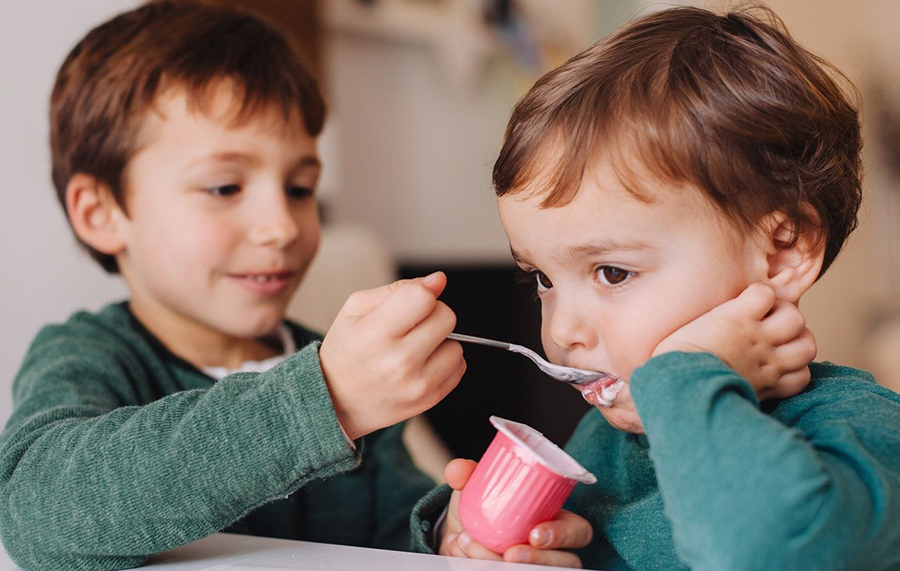
However, I do not believe this style of eating is physiologic (natural) and I still maintain that there’s value in the tradition of the family meal far above and beyond the mere dietary component. In additional there is a further subtext here which has nothing to do with nutrition, and that is helping a child learn the important life skills of self-discipline and delayed gratification. Just my opinion, but I cannot see how allowing your son or daughter to indiscriminatingly snack on demand and never ever having to deal with the sensation of hunger aids in teaching them these lessons. When it comes to parenting little things like this matter, much more so than you could imagine. Be advised.
As a parent you must form a succinct approach to the ultra-discriminating eater, and stated simply it is this—if your child does not meet your minimum expectations at a given sitting they are permitted to have nothing but water until the next meal is served. Truer words were never written than the following, and I suggest they be taken to heart:
IN THE HISTORY OF THE WORLD NO CHILD EVER STARVED TO DEATH WITH FOOD ON THE TABLE
Accepting this statement and believing it will change everything. So if the next morning your son declines the spinach quiche you so lovingly prepared for his enjoyment then fine, no big deal. You say he doesn’t want any of the vegetable soup you ladled up for lunch? That’s okay. He can enjoy a nice cold glass of water should he happen to get hungry or thirsty in the afternoon. No thank you to the meat loaf and Brussel sprouts at dinnertime? No problem. But it’s going to be a long, long, lonnnnng time until breakfast. I’m serious, and you should be, too. It is in your child’s best interest for you to hold the line. That is how he or she will learn to eventually expand their food choices and have a healthier diet. In fact, it is the only way. Hey, it even worked with Keith, and believe me, if it worked for him it will work for anyone. And once they get in the routine of eating better at mealtimes you can soften up and beginning offering those snacks again. Nutritious, of course.
Enjoying A Meal
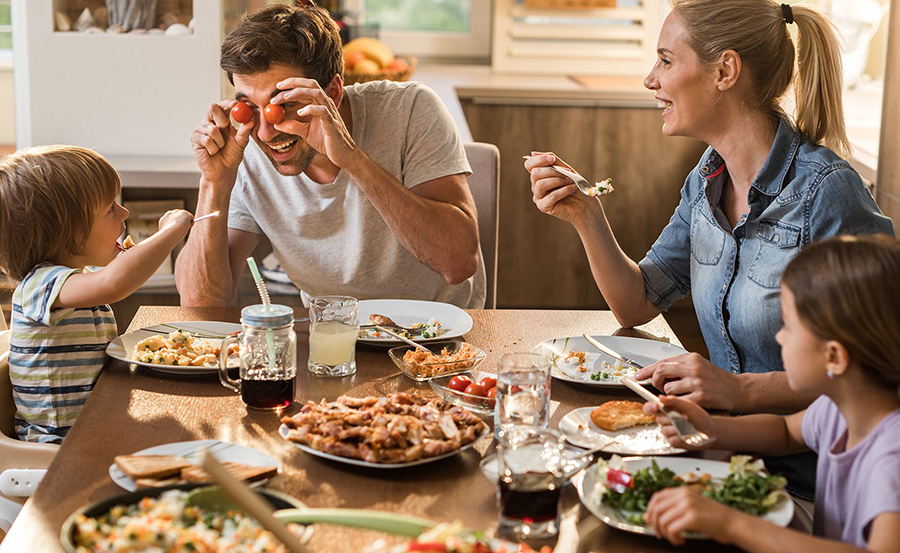
Your responsibility begins and ends with serving your children nourishing foods three times a day. That’s all you have to do—the rest is up to them. When they get hungry enough they will eat, and if the only offering available at that time happens to be something healthy then so much the better. Keep family mealtimes pleasant no matter what. If your child happens to choose hunger instead of a green bean casserole then so be it, let him or her bear the obvious natural consequences of no dessert and an unhappy, dissatisfied tummy later. Remember, you can always fall back on the daily multivitamin as an insurance policy.
And one final point… As a general rule if you happen to notice that your child has only eaten Snickers for the previous seven days you have a problem on your hands that needs to be addressed. Oh yes, most definitely, you do have a problem.
☤

